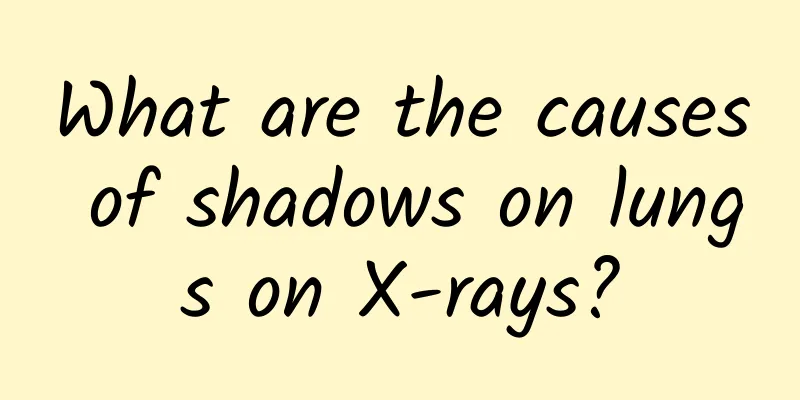What are the causes of shadows on lungs on X-rays?

|
X-ray examination of the lungs is very common in clinical practice. This method of examination can detect lung diseases in a timely manner. In addition, many lung diseases will have shadows in the lungs during the examination. Generally, they are caused by pneumonia, tuberculosis, bronchiectasis and other diseases. Only by finding the detailed cause can treatment be carried out. So what are the reasons for shadows in the lungs on X-rays? First, what are the reasons for shadows in the lungs on X-rays? Pneumonia: It is a lung infection caused by pathogenic microorganisms (bacteria, mycoplasma, chlamydia, viruses, etc.). In addition to lung shadows on X-ray examinations, patients also have symptoms such as coughing, sputum, fever, chest tightness, fatigue, and difficulty breathing. In severe cases, infectious toxic shock may even occur. The most common pathogenic microorganisms are bacteria. The shadows often appear in flakes on chest X-rays. In severe cases, the entire lung lobe may be affected. A routine blood test can reveal a significantly increased white blood cell count. After anti-inflammatory treatment with antibiotics, a review of the chest X-ray can reveal that the lung shadows have been significantly reduced or even completely disappeared. Generally, the patient will recover after 2 weeks of treatment. Second, pulmonary tuberculosis: It is a lung infection caused by a special bacterium, Mycobacterium tuberculosis, and its incidence has been increasing in recent years. Common locations are the apex, posterior segment of the upper lung and dorsal segment of the lower lobe on both sides. The shadows appear as scattered flakes, which may contain calcification foci, sometimes spherical lesions or miliary lesions. In rare cases, the entire lobe of one lung may be affected, forming a so-called "destroyed lung." Patients often have symptoms of tuberculosis poisoning such as coughing, sputum, hemoptysis, low-grade fever in the afternoon, fatigue, night sweats, and loss of appetite. If acid-fast bacilli are found in the sputum and the skin tuberculin test is strongly positive, the diagnosis can usually be confirmed. Most patients with pulmonary tuberculosis respond well to treatment with anti-tuberculosis drugs (remifen, levofloxacin, ethambutol, etc.), but if the spherical tuberculosis lesions are combined with cavities, or if there is "damaged lung", they should undergo thoracic surgery for resection. What are the reasons for shadows in the lungs on X-rays? Bronchiectasis: It is the enlargement of the bronchial cavity caused by purulent infection of the bronchial wall. It is an irreversible infection. Chest X-rays show increased, thickened, and disordered lung texture. Severe bronchiectasis may appear as small, beaded translucent areas with typical honeycomb-like shadows. Common symptoms are long-term coughing up purulent sputum and coughing up blood. In the past, iodized bronchial oil contrast was the gold standard for diagnosing bronchiectasis. Currently, spiral CT can reconstruct bronchial morphology without any trauma, and has basically replaced iodized bronchial oil contrast. If the lesions are limited to 1-2 lung lobes and the general condition is good, surgical treatment should be actively performed; however, if the lesions are extensive on both sides, surgery is not recommended. |
<<: What is the cause of increased density of lung patches?
>>: What does high-density lung shadow mean?
Recommend
Is it better to use a moxibustion box or a moxibustion jar?
Moxibustion cups or moxibustion boxes are both us...
What should we do if children get millet-sized bumps?
When spring comes and flowers bloom, many parents...
How to deal with scars left by mouth inflammation
In daily life, mouth inflammation is a common phe...
What is the use of scraping and what are the benefits of scraping?
Gua Sha therapy has been widely spread among the ...
Can myocarditis be cured?
People may not know much about myocarditis, but t...
Can I use cold compresses on my skin allergies?
Cold compress is a very effective way to relieve ...
Rib pain under right breast
In our daily lives, we cannot avoid lifting some h...
How to make lithospermum oil
Many people don’t know about lithospermum oil. In...
Where to apply moxibustion on hand numbness
Numbness in the hands is common among many middle...
What are the symptoms of bronchial cough
Bronchial cough is a cough caused by the bronchi....
Heat-clearing and dampness-removing soup, drink these three most effective
On weekdays, some people often choose to drink so...
How long can you live with rectal cancer?
The most common cancer is rectal tumor. In recent...
What are the side effects of Shenglong Teeth?
Raw dragon teeth can be used to treat many diseas...
Feeling uncomfortable and stuffy in the chest: massage Guanchong acupoint
Many people feel uncomfortable, chest tightness, ...
What to do if there is something rubbing against your upper eyelid?
In daily life, if you feel a foreign body on your...









